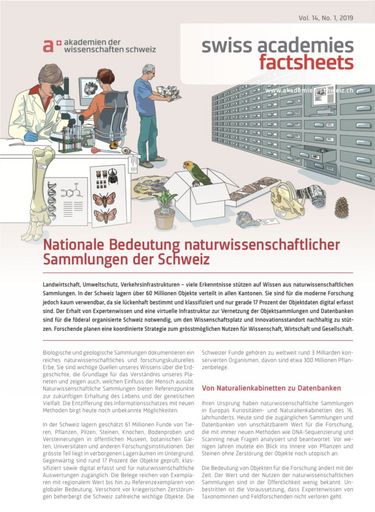Related topics

Ausschreibung für Projekte zur Erschliessung naturwissenschaftlicher Sammlungen
Schweizer Museen, botanische Gärten und Universitäten können beim Netzwerk Naturhistorische Sammlungen (SwissCollNet) Projekte zur besseren Erschliessung und Digitalisierung ihrer naturwissenschaftlichen Sammlungen einreichen.
Image: Lisa Schäublin / NM Bern
Nationale Bedeutung naturwissenschaftlicher Sammlungen der Schweiz
Landwirtschaft, Umweltschutz, Verkehrsinfrastrukturen – viele Erkenntnisse stützen auf Wissen aus naturwissenschaftlichen Sammlungen. In der Schweiz lagern über 60 Millionen Objekte verteilt in allen Kantonen. Sie sind für die moderne Forschung jedoch kaum verwendbar, da sie lückenhaft bestimmt und klassifiziert und nur gerade 17 Prozent der Objektdaten digital erfasst sind. Der Erhalt von Expertenwissen und eine virtuelle Infrastruktur zur Vernetzung der Objektsammlungen und Datenbanken sind für die föderal organisierte Schweiz notwendig, um den Wissenschaftsplatz und Innovationsstandort nachhaltig zu stützen. Forschende planen eine koordinierte Strategie zum grösstmöglichen Nutzen für Wissenschaft, Wirtschaft und Gesellschaft.
National significance of natural history collections in Switzerland
Biological and geoscience collections form an important part of our rich scientific heritage and provide the basis for much of what we know today about our planet and how we humans have influenced it. Natural history collections help us to understand our past and present better, thereby providing a basis for predicting the future. They also serve as biobanks for preserving the Earth’s organismic and genomic diversity, and must not only be maintained, but also supplemented so that scientists can continue to document and explore life on Earth. As new investigative techniques emerge, we can discover more from studying such intact and well-preserved collections.
Image: Akademien Schweiz